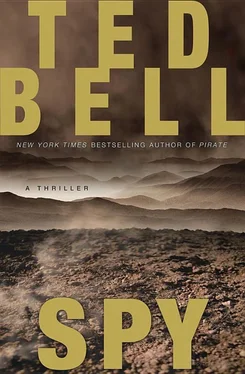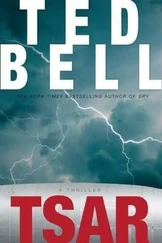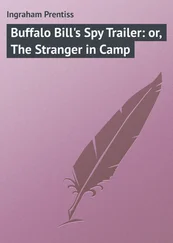“Hey,” one of them said. Franklin recognized him as one of the boys from the Wagon Wheel he’d locked up. Had the same sleeveless leather vest and the prison tats covering both arms. If he remembered the arrest record correctly, these two gentlemen’s names were Hambone and Zorro. William Bonner, Hambone, and Bernie Katz, Zorro represented a whole lot more trouble than they were worth.
“Howdy, Hambone,” Franklin said to Bonner. He saw that the gate was padlocked with a big Master lock.
“Can we help you?” Bonner asked.
“You can open that gate.”
“No can do, Sheriff. Private party.”
“Homer,” Franklin said, “take your sidearm out and shoot that lock off, will you please?”
“Yes, sir.”
Homer removed his weapon and fired two rounds into the heavy padlock. The thing blew apart, wide open, which surprised Franklin because he’d seen an old commercial where a slow motion bullet goes right through a padlock without any effect. He reached over and pulled the chain out of the gate rungs and dropped it to the ground. Then he started to swing the right gate inward. Hambone stepped into the path of the gate and crossed his lodgepole arms over his chest.
“Like I say, it’s private.”
“Mr. Bonner, you boys just got out of my jail. If one of those Mexican boys is harmed, you’re going back. If one of them dies, you’re going back inside the system for twenty years as an accessory to murder. How do you want to handle this?”
“It ain’t murder to kill no illegal alien.”
“Murder is murder, Mr. Bonner.”
Bonner didn’t respond. Just looked over his shoulder and spat on the ground.
“C’mon, Billy,” the one named Katz said. “Let it go. We don’t need any more shit from this particular asshole.”
Bonner looked at Dixon and did his best impression of a man staring daggers into somebody’s eyes for a couple a seconds and then he kicked the ground and walked away from the gate.
“Where are your bikes located, Bonner?” Franklin said to the man’s back.
“Over there in the pecan grove,” Katz said, pointing at the trees. You could see pinpoints of chrome back in there among the dark trunks.
“I suggest you fellas mount up and git. I don’t want you in my county any longer. You understand what I’m saying? If you’re still here when I come back this way, I’m going to impound your motorcycles and lock you up again. We clear?”
The two outlaws didn’t say anything, just turned and headed for the pecan trees.
Franklin swung the two aluminum gates inward while Homer went back for the car. After a minute, he heard the deep popping noise of the two Harleys cranking up in the woods as Homer drove through and came to a stop. He climbed inside and they continued up the drive to the ranch house proper.
Homer was staring straight ahead, driving as fast as he could over the uneven ground. He spoke to Franklin without looking at him.
“You recall seeing those fires at Yellowstone on the TV, Sheriff? Burning out of control? Threatening all those little tinderbox towns.”
“Yeah. I remember that.”
“Sometimes I feel like the border is one long tinderbox. Like Prairie is nothing but a tiny oasis in the middle of a dried up pine forest. It’s baking hot day after day and folks are walking around knee deep in pine needles. Bone dry. And everybody on Main Street is striking matches.”
“Some folks think those big fires are natural remedies, Homer. Just nature taking care of itself.”
Homer looked at him. “I have a real hard time believing that, Sheriff.”
“Well, you better slow down, son, there’s the ranch house right over there.”
There were four or five pickups pulled up outside the house. Homer hit the brakes and they got out and knocked on the front door. They waited a minute but nobody came and so they walked around the side of the house and down to the dried up river bed about five hundred yards away.
There was a big live oak tree standing at the bend on the other side of what used to be the river. It had been dead for years, but still had a lot of its lower limbs. Even from a distance you could see that somebody had looped three ropes over the lowest and biggest branch and tied a noose at the end of each one.
“Looks like we’re just in time,” Franklin said to Homer.
The men were standing at the base of the tree and Franklin could make out three small boys on the ground. They were sitting with their backs to each other, probably all tied together at the wrists. The local men, and one woman, were standing in a circle, just looking down at the boys.
“No need for you here, Sheriff,” Ed Parks said, stepping forward as the two lawmen crossed the dusty riverbed.
Franklin said, “Good afternoon, Ed. Boys. You, too, Miz Brotherwood. I hear these kids broke into your house last night.”
“That’s right they did,” Sadie Brotherwood said. “I caught ’em red-handed trying to steal my whisky.”
“Why didn’t you call the police?” Dixon said, brushing past two of the men and squatting in the dirt beside the boys. Their sun-blackened skin was bloody in places and their mouths were crusted with salt. Their black eyes were glazed with fear and exhaustion.
“Police? No need of calling anybody,” Parks said. “Waste of taxpayers’ money. We call the police every time we catch a bunch of these pollos, you wouldn’t have time to hand out parking tickets. No, we like to take care of this business ourselves out here. I told these boys we didn’t need no grass cut either. Hell, they’re just tonks. I reckon that’s why they’re here, brought in by coyotes and looking to cut grass up in Houston.”
“Goddamn pollos ain’t hardly human anyhow,” Mrs. Brotherwood said. “I don’t know what all the fuss is about.”
Franklin looked for some sign of grief in the widow’s eyes but only saw hard-bitten hatred and the dull gleam of self-righteousness. He un-screwed the cap from the canteen he’d brought and held it to the lips of the first boy. After the boy had drunk some water, he moved to the next one and repeated the process. The last boy, the smallest, was too weak to lift his head and drink.
“He’s mighty thirsty, Ed,” Franklin said. “You didn’t give them any water?”
“Why waste good water?”
“Que pasa hombre?” Franklin said to the oldest of the three after he’d gulped down some water. “Where are you from?”
“Nuevo Laredo,” the boy said, his voice a parched whisper.
“How many of you come across?”
“We were fourteen. We walked until we fell. My brothers and I, we are the last ones.”
“What is your name?”
“Reymundo.”
“And your brothers?”
“Jorge and Manuelito.”
Franklin stood up and looked at Parks and Sadie Brotherwood.
“All right, then. Here’s what we’re going to do. Mrs. Brotherwood, I’d like you to apologize to Mr. Parks here for bringing him all the way out for nothing.”
“It wasn’t nothing,” she said, “It was three more wetbacks needed a good hanging.”
“Ed, you and the boys go on home. Homer and I will see these children get medical attention and then we’ll turn them over to the Border Patrol.”
“I’m gonna tell you something, Sheriff. I’ll go. But its people like you are going to ruin this great country. There are already more of them than us down here in West Texas. Hell, whole towns of ’em without a single white inhabitant. Not one! You want to give them the whole state? Is that your idea of right and wrong? Goddamn it, I don’t understand you anymore. I thought you were one of us. Hell, I voted for you in the last election. Now I ain’t so sure who the hell you are, Franklin.”
“I’m the law, Ed. That’s all. Now go on home.”
Читать дальше












